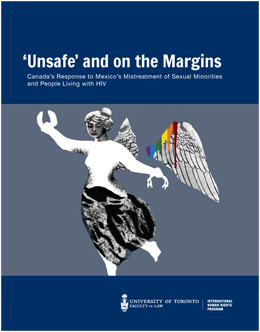New report highlights how Mexico remains unsafe, particularly for people affected by HIV
(Toronto, June 20, 2016) — Canada should remove Mexico from its refugee ‘safe’ list because of the country’s serious human rights abuses, the University of Toronto’s International Human Rights Program (IHRP) said in a new report released today. Failure to do so could place Canada in violation of its international legal obligations.
 The 54-page report, “‘Unsafe’ and on the Margins: Canada’s Response to Mexico’s Mistreatment of Sexual Minorities and People Living with HIV,” (PDF) is based on IHRP field research in Mexico, including interviews with more than 50 Mexican healthcare providers, human rights activists, members of the lesbian, gay, bisexual, transgender and intersex (LGBTI) community, people living with HIV, journalists, and academics, all of whom testify to widespread discrimination and rights-violations in Mexico’s healthcare delivery. The release of the report, funded by the Elton John AIDS Foundation, coincides with World Refugee Day on June 20 as well as Canada’s first-ever pride month.
The 54-page report, “‘Unsafe’ and on the Margins: Canada’s Response to Mexico’s Mistreatment of Sexual Minorities and People Living with HIV,” (PDF) is based on IHRP field research in Mexico, including interviews with more than 50 Mexican healthcare providers, human rights activists, members of the lesbian, gay, bisexual, transgender and intersex (LGBTI) community, people living with HIV, journalists, and academics, all of whom testify to widespread discrimination and rights-violations in Mexico’s healthcare delivery. The release of the report, funded by the Elton John AIDS Foundation, coincides with World Refugee Day on June 20 as well as Canada’s first-ever pride month.
Despite some progressive legislation, including universal healthcare and a federal commitment to non-discrimination, in practice, Mexico’s most vulnerable communities continue to encounter significant obstacles to accessing these rights. As a result, the country remains unsafe for many, particularly people living with HIV or at heightened risk of infection, and especially sexual minorities and marginalized populations. Nevertheless, Mexico appears on Canada’s designated country of origin (DCO) list, which entitles Mexican claimants to only half the time claimants from non-DCO countries get to prepare their claims, and creates the possibility of prejudgment among decision-makers, the report said.
“While Mexico has undertaken significant reforms to combat discrimination and human rights violations, people living with HIV, sexual minorities and other vulnerable Mexicans still have little protection when their rights are violated,” said Samer Muscati, IHRP director. “Mexico’s failure to investigate and hold perpetrators accountable for violent crimes against marginalized populations is completely at odds with Canada’s designation of the country as ‘safe’.”
The report raises concerns that Canada is circumventing its international legal obligations by keeping Mexico on the ‘safe’ country list. As a signatory to the 1951 Refugee Convention and the 1967
Protocol, Canada has a duty to not discriminate against refugee claimants by reason of their race, religion or country of origin.
According to the report, systemic discrimination and unlawful denial of healthcare to people living with HIV and populations at heightened risk of infection contravene Mexico’s international legal obligations. Proper and timely HIV treatment can mean a healthy life-span for people living with HIV, but late diagnosis or lack of consistent treatment creates a high risk of life-threatening infection and higher likelihood of transmission.
Furthermore, Mexico’s failure to adequately fund HIV prevention or education programs has contributed to a culture of stigma and discrimination against people living with HIV. Health advocates told the IHRP about ignorance and misinformation about HIV within the medical community, breaches of confidentiality, denial of healthcare or segregation within healthcare centres, and other human rights abuses against people living with HIV.
The report calls on Canada in its capacity as a champion of human rights, both domestically and internationally, and also as Mexico’s third-largest trading partner. As expressed in the report’s recommendations, Canada should urge Mexico to ensure that people living with HIV are able to access healthcare services free from obstruction or discrimination. The report also encourages Canada to offer assistance to Mexico to develop protocols for healthcare professionals to ensure equal and consistent access to healthcare, with particular emphasis on people living with HIV, in accordance with Mexico’s international legal obligations.
“A country that regularly denies access to fundamental health rights and HIV treatment for its marginalized communities cannot be called a ‘safe’ country,” said Muscati. “Mexico may be one of Canada’s largest trading partners, but Canada has an obligation to look past that relationship and acknowledge the harsh reality facing sexual minorities and others affected by HIV in Mexico.”
---- 30 ----
READ THE REPORT
“‘Unsafe’ and on the Margins: Canada’s Response to Mexico’s Mistreatment of Sexual Minorities and People Living with HIV,” is available for download here: http://ihrp.law.utoronto.ca/utfl_file/count/PUBLICATIONS/Report-UnsafeAndOnMargins2016.pdf
AVAILABLE FOR COMMENT

 The 54-page report, “‘
The 54-page report, “‘